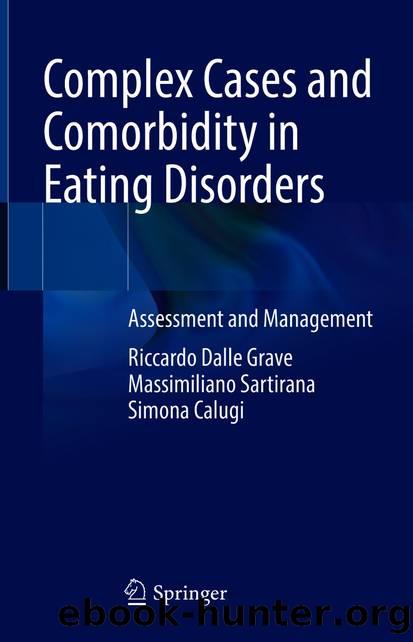Complex Cases and Comorbidity in Eating Disorders by Riccardo Dalle Grave & Massimiliano Sartirana & Simona Calugi

Author:Riccardo Dalle Grave & Massimiliano Sartirana & Simona Calugi
Language: eng
Format: epub
ISBN: 9783030693411
Publisher: Springer International Publishing
The more of these features that are reported by the patient, the more confident we are that a diagnosis of clinical depression is warranted.
The distinction between depression secondary to the eating disorder and coexisting clinical depression is essential for an optimal therapeutic intervention. In the former case, the depressive features should not be treated because they tend to resolve alongside an improvement in the eating-disorder psychopathology. Indeed, addressing the consequences of eating disorder with a pharmacological or psychological treatment designed for another psychiatric disorder may increase the risk of deviating from the treatment of the eating-disorder psychopathology and, in any case, expose the patients to side effects without the possibility of achieving significant improvements.
In contrast, coexisting clinical depression must be identified and treated because it hinders the treatment of the eating disorder itself. Those suffering from coexisting clinical depression think that it is not possible to change, have little energy to engage in treatment, and too poor concentration to understand and retain the information provided. In these cases, we recommend a pharmacological treatment (antidepressants) for 9â12 months, after having educated the patients and obtained their informed consent. The decision to use antidepressants rather than a psychological treatment to address the coexisting clinical depression is based on two principal observations [3]: (i) psychological treatment of clinical depression requires a lot of time, and progress is limited by the presence of the eating disorder as the two psychopathologies negatively interact; and (ii) antidepressants, in particular SSRIs (e.g., fluoxetine and sertraline), generally work rapidly and well.
If a patient has reservations about taking antidepressants, they should be informed that these psychopharmacological agents do not interfere with the ability to do things in life, and that the resolution of clinical depression will allow them to be in the best condition to handle psychological treatment of their eating disorder. In addition, antidepressant drugs are not addictive, they are not mood enhancers (they only treat depression), and have few side effects (e.g., nausea), which are usually transient and last only a few days. The patient should be reassured that should they develop more persistent side effects, such as a fine hand tremor, difficulty swallowing, and decrease or loss of sexual desire, their antidepressant regime will be reassessed. Eating disorder patients will also be interested to know that SSRIs do not increase appetite although fluoxetine at higher doses (60 mg daily) can reduce the propensity to binge eat. They should be warned that SSRIs are, however, associated with a greater sensitivity to the intoxicating effects of alcohol, and so be advised to drink with caution.
Patients with severe clinical depression refusing antidepressants may nevertheless be offered an inpatient CBT-E-based treatment that targets both coexisting disorders simultaneously. Indeed, a study conducted by our team found no significant differences in the outcomes of inpatient CBT-E between eating-disorder patients with or without clinical depression [6]. Table 6.1 shows a summary of the strategies used for assessing and treating coexisting clinical depression in eating disorders according to CBT-E recommendations [3, 7].Table 6.1CBT-E recommendations
Download
This site does not store any files on its server. We only index and link to content provided by other sites. Please contact the content providers to delete copyright contents if any and email us, we'll remove relevant links or contents immediately.
| Administration & Medicine Economics | Allied Health Professions |
| Basic Sciences | Dentistry |
| History | Medical Informatics |
| Medicine | Nursing |
| Pharmacology | Psychology |
| Research | Veterinary Medicine |
When Breath Becomes Air by Paul Kalanithi(7267)
Why We Sleep: Unlocking the Power of Sleep and Dreams by Matthew Walker(5649)
Paper Towns by Green John(4173)
The Immortal Life of Henrietta Lacks by Rebecca Skloot(3829)
The Sports Rules Book by Human Kinetics(3591)
Dynamic Alignment Through Imagery by Eric Franklin(3491)
ACSM's Complete Guide to Fitness & Health by ACSM(3470)
Kaplan MCAT Organic Chemistry Review: Created for MCAT 2015 (Kaplan Test Prep) by Kaplan(3426)
Introduction to Kinesiology by Shirl J. Hoffman(3305)
Livewired by David Eagleman(3128)
The River of Consciousness by Oliver Sacks(2995)
Alchemy and Alchemists by C. J. S. Thompson(2914)
The Death of the Heart by Elizabeth Bowen(2906)
Descartes' Error by Antonio Damasio(2738)
Bad Pharma by Ben Goldacre(2731)
The Gene: An Intimate History by Siddhartha Mukherjee(2494)
Kaplan MCAT Behavioral Sciences Review: Created for MCAT 2015 (Kaplan Test Prep) by Kaplan(2493)
The Fate of Rome: Climate, Disease, and the End of an Empire (The Princeton History of the Ancient World) by Kyle Harper(2441)
The Emperor of All Maladies: A Biography of Cancer by Siddhartha Mukherjee(2432)
